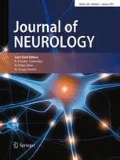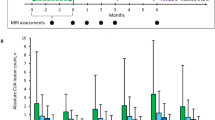Abstract
The objective of this study was to assess the effect of secukinumab, a monoclonal antibody that inhibits interleukin (IL)-17A, on number of new active brain magnetic resonance imaging (MRI) lesions in subjects with relapsing-remitting multiple sclerosis (MS). Subjects (N = 73) were randomized 1:1 to secukinumab 10 mg/kg or placebo by intravenous infusion at weeks 0, 2, 4, 8, 12, 16, and 20. MRI scans were obtained within 30 days prior to randomization, on a monthly basis during the treatment period, and at study completion. The primary endpoint was the cumulative number of combined unique active lesions (CUAL) observed on brain MRI scans from week 4 to week 24. Compared with placebo, secukinumab non-significantly reduced the number of CUAL observed on 4-weekly MRI from week 4 to 24 (primary endpoint) by 49 % (95 % CI −10 to 77 %; P = 0.087) and significantly reduced the number of cumulative new gadolinium-enhancing T1 lesions by 67 % (31–84 %, P = 0.003). CUAL reductions were progressively greater from week 4 (1 %) to week 16 (49 %) and persisted until end-study (50 %). There were no serious adverse events; the adverse event rate was comparable to placebo (53 versus 49 %), although mild-to-moderate infection was somewhat more frequent (37 versus 23 %). This proof-of-concept study provides the first evidence that blocking IL-17A with an antibody may reduce MRI lesion activity in MS. Further studies are needed to confirm this finding and determine the magnitude of effect.



Similar content being viewed by others
References
Tzartos JS, Friese MA, Craner MJ et al (2008) Interleukin-17 production in central nervous system-infiltrating T cells and glial cells is associated with active disease in multiple sclerosis. Am J Pathol 172:146–155
Caccamo N, La Mendola C, Orlando V et al (2011) Differentiation, phenotype, and function of interleukin-17-producing human Vγ9 Vδ2 T cells. Blood 118:129–138
Bălaşa R, Bajko Z, Huţanu A (2013) Serum levels of IL-17A in patients with relapsing-remitting multiple sclerosis treated with interferon-β. Mult Scler 19:885–890
Yan Y, Ding X, Li K et al (2012) CNS-specific therapy for ongoing EAE by silencing IL-17 pathway in astrocytes. Mol Ther 20:1338–1348
Segal BM, Constantinescu CS, Raychaudhuri A, Kim L, Fidelus-Gort R, Kasper LH, Ustekinumab MS Investigators (2008) Repeated subcutaneous injections of IL12/23 p40 neutralising antibody, ustekinumab, in patients with relapsing-remitting multiple sclerosis: a phase II, double-blind, placebo-controlled, randomised, dose-ranging study. Lancet Neurol 7:796–804
Vollmer TL, Wynn DR, Alam MS, Valdes J (2011) A phase 2, 24-week, randomized, placebo-controlled, double-blind study examining the efficacy and safety of an anti-interleukin-12 and -23 monoclonal antibody in patients with relapsing-remitting or secondary progressive multiple sclerosis. Mult Scler 17:181–191
Langley RG, Elewski BE, Lebwohl M et al, ERASURE Study Group; FIXTURE Study Group (2014) Secukinumab in plaque psoriasis–results of two phase 3 trials. N Engl J Med 371:326-338
Genovese MC, Durez P, Richards HB et al (2013) Efficacy and safety of secukinumab in patients with rheumatoid arthritis: a phase II, dose-finding, double-blind, randomised, placebo controlled study. Ann Rheum Dis 72:863–869
McInnes IB, Sieper J, Braun J et al (2014) Efficacy and safety of secukinumab, a fully human anti-interleukin-17A monoclonal antibody, in patients with moderate-to-severe psoriatic arthritis: a 24-week, randomised, double-blind, placebo-controlled, phase II proof-of-concept trial. Ann Rheum Dis 73:349–356
Baeten D, Baraliakos X, Braun J et al (2013) Anti-interleukin-17A monoclonal antibody secukinumab in treatment of ankylosing spondylitis: a randomised, double-blind, placebo-controlled trial. Lancet 382:1705–1713
Polman CH, Reingold SC, Edan G et al (2005) Diagnostic criteria for multiple sclerosis: 2005 revisions to the “McDonald Criteria”. Ann Neurol 58:840–846
Havrdova E, Belova A, Goloborodko A et al (2013) Sensitivity analysis of a phase IIa study of secukinumab in relapsing remitting multiple sclerosis. Mult Scler J 19:210–211 (poster number P520)
Jansen PA, Rodijk-Olthuis D, Hollox EJ et al (2009) Beta-defensin-2 protein is a serum biomarker for disease activity in psoriasis and reaches biologically relevant concentrations in lesional skin. PLoS One 4:e4725
Acknowledgments
This study was supported by the Novartis Institutes for BioMedical Research. The authors thank the subjects and investigators who participated in this study. Barry Weichman, Ph.D., and Eric Justice of BioScience Communications, New York, NY, provided writing and editorial assistance, respectively, supported by Novartis Pharma AG. E. H. has been supported by the Czech Ministry of Education (PRVOUK-P26/LF1/4).
Author information
Authors and Affiliations
Corresponding author
Ethics declarations
Conflicts of interest
E. H. has received speakers’ honoraria and research grant support from Bayer Schering Healthcare, Biogen Idec, Sanofi Genzyme, Merck Serono, Novartis, and Teva, and has received compensation for Advisory Board activities from Biogen Idec, Sanofi Genzyme, Merck Serono, Novartis, and Teva. A. B. and A. G. have no competing financial interests to disclose. A. T., A. W., E. W., and R. P. M. are employees of, and own stock/stock options in Novartis. H. G. was an employee of Novartis at the time the study was conducted. D. R. J. was an employee of Novartis and owned stock/stock options in Novartis at the time the study was conducted.
Ethical standard
The study was conducted according to the ethical principles of the Declaration of Helsinki, and the protocol was approved by the Independent Ethics Committee at each site. The study is registered with ClinicalTrials.gov (NCT01051817) and the full protocol is available from the sponsor. The results of this study were presented, in part, at the 28th Congress of the European Committee for Treatment and Research in Multiple Sclerosis, Lyon, France, October 10–13, 2012.
Informed consent
All subjects provided informed consent prior to randomization.
Additional information
On behalf of the AIN457 for MS Study Group.
Electronic supplementary material
Below is the link to the electronic supplementary material.
Rights and permissions
About this article
Cite this article
Havrdová, E., Belova, A., Goloborodko, A. et al. Activity of secukinumab, an anti-IL-17A antibody, on brain lesions in RRMS: results from a randomized, proof-of-concept study. J Neurol 263, 1287–1295 (2016). https://doi.org/10.1007/s00415-016-8128-x
Received:
Revised:
Accepted:
Published:
Issue Date:
DOI: https://doi.org/10.1007/s00415-016-8128-x




